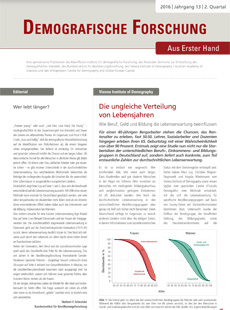July 06, 2016 | Defo News
Unequal distribution of life-years

Issue 02/2016 © MPIDR
The new issue (Nr. 2/2016) of Demografische Forschung Aus Erster Hand, the popular science newsletter with latest research results from demography, has been released. (The Newsletter is available in German only.)
Topics of the 2/2016 issue:
1. Unequal distribution of life-years
How the job, money and education influence life expectancy.
The chances of a 40-year-old miner to survive to retirement age are almost 50/50. But for teachers, social workers and lecturers, the likelihood to have a 65th birthday is over 90%. For the first time ever, a study now identifies not only the mortality risks of different professional, income, and education groups in Germany, but also provides concrete and, to an extent astonishing, figures on average life expectancy.
2. Short life of interwar children
Life-expectancy stagnation of Danish women is largely due to high mortality of inter-war generations.
In 1960, Denmark took 4th place in the OECD ranking list of female life expectancy. But nearly 50 years later, the average life expectancy of Danish women was just enough to take the low middle field, at place 26. There was rapid consensus that smoking behavior is the single most factor in explaining the low position. But this is only part of the explanation, as shown by a study published in the scientific journal PNAS.
3. Why men feel healthier and women live longer than men
A study in Moscow provides possible explanations for the paradoxical gender differences in health.
In most countries, men score pretty well in assessing their own health and physical performance. Yet, they have a lower life expectancy. The paradox is especially pronounced in Russia, where men on average die eleven years earlier – yet they are healthier. Or aren’t they?
"Demografische Forschung Aus Erster Hand" is a joint publication of the Max Planck Institute for demographic Research (MPIDR), the Rostocker Zentrum zur Erforschung des Demografischen Wandels (RZ), the Vienna Institute of Demography (VID), the Wittgenstein Centre for Demography and Global Human Capital and the Federal Institute for Population Research (BiB). The newsletter is released four times a year and is available electronically and as a printed version and is free of charge.
All past issues are available online on the Newsletter website. On the website you also have the possibility to subscribe to the Newsletter to get informed about the release of the new issues or to receive the printed versions by mail.